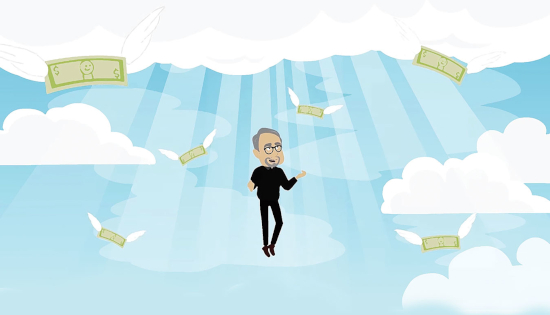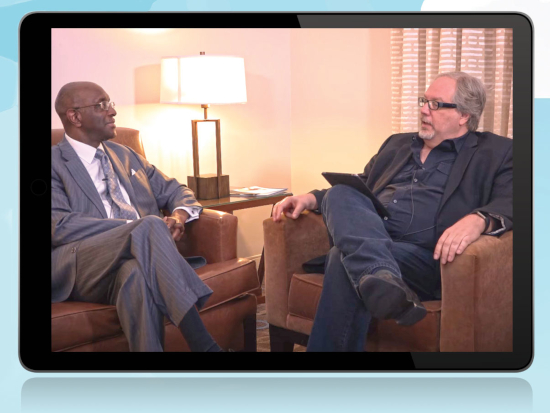Bryan P. Stone faced a conundrum: How best to help his students at Boston University School of Theology increase their financial literacy.
Stone, who serves as associate dean for academic affairs, as well as E. Stanley Jones Professor of Evangelism and co-director of the Center for Practical Theology, recognized that graduate students in theology need a well-developed theological understanding of money and stewardship as well as practical financial tools to use, both on a personal level and on a professional level, as current or future leaders of churches and other organizations.
The school had offered an optional one-credit course on faith and finance a few times, but it was difficult to find instructors who were sufficiently well versed in both aspects of the course; guest speakers who focused on the financial aspect often didn’t understand how to effectively present their material to an audience of theology students. It was time to go back to the drawing board.
Stone started thinking big — or massive, actually. He received funding from the Association of Theological Schools (through an initiative called “Economic Challenges Facing Future Ministers”) and collaborated with Boston University’s Digital Education Incubator, a campus unit dedicated to helping faculty members innovate content delivery to improve student outcomes. Then he moved forward with developing a Faith and Finance Massive Open Online Course (MOOC).
To solve the problem he encountered in the traditional one-credit course, Stone reached out to top experts in fields such as economic ethics, biblical studies, and socially responsible investing to serve as guest speakers in the course. Stone himself has done extensive work with faith-based nonprofits and fundraising, and he leads the sessions on those topics. Throughout the MOOC, he conducts a number of interviews, and other perspectives are included via TED Talk excerpts and other pre-recorded selections. “Our faculty for this course, if we can use that term broadly, includes a lot of people,” says Stone. Students hear from scholars Walter Brueggemann, Ched Myers, and Claire Wolfteich; nonprofit consultant Herb Tobin; and Morgan Stanley executive Audrey Choi, among others. These segments are interspersed with lectures by Stone, who frequently appears in the videos as a bespectacled cartoon avatar (pictured below). The pleasant strumming of an acoustic guitar leads into each session.
|

|
| Boston University Media Production Manager Tim Brenner created graphics for the MOOC, including an avatar of Bryan P. Stone, using simple animation software called GoAnimate (now called Vyond). |
This polished final product, of course, required a great deal of work. Stone started collaborating with the Incubator staff more than six months before creating any content. He determined the desired outcomes for the course and then worked backward, considering how best to construct each session, from who the guest speaker should be to how they should deliver their information. “It’s a very intentional, painstaking process,” he says. At key points throughout the course’s development he brought in colleagues who had expertise relevant to the course. Throughout the planning and production, the Incubator staff served as the liaison with edX, the platform that hosts the MOOC, and provided technology and course-design support.
The MOOC launched in the fall of 2017. It runs for a semester and includes six parts: religious perspectives on money; connecting faith to money; spending, debt, and the freedom of simplicity; responsible investing; financial literacy for faith-based institutions; and fundraising and philanthropy. All masters-level students in their first year at the School of Theology take the Faith and Finance MOOC. They are joined by learners from around the globe who access the free course online at edx.org. In the fall of 2018 — only the second run of the course — 80 Boston University students were joined by an additional 1,465 classmates from 29 countries, including 77 learners in Peru, 64 in India, 29 in Nigeria, and 19 in the Philippines.
Amazingly, the MOOC is set up to run with only one coordinator. Kathryn House, a doctoral candidate in practical theology, makes sure everything is on track and responds to any issues that arise. “I am pleasantly surprised at how easy the course is to run once it’s made — but boy, it was a lot of work,” says Stone. Even after all that work, Stone is constantly rethinking the course and is open to finding content that more clearly illustrates the material.
There are challenges, of course. “It can feel lonely taking that MOOC,” says Stone. “It really is an individual, independent course.” The Boston University students have one in-person session midway through the semester, when they discuss themes from the course in small groups. “It’s good for them to bounce ideas off of other people in the course and integrate what they’re learning,” Stone says. Additionally, students come to the course with a wide range of backgrounds. “If they already know a lot about finance, it may seem like very introductory material. But for the vast majority of our students, it’s all new. They’re going to have to know how to read a balance sheet or an income statement when they start leading a church or a nonprofit organization, so we walk through those things.” Also new (and challenging) for many students is the opportunity to reflect on their own relationship with money. Few people consider that relationship in a systematic manner and from a spiritual perspective. For instance, Stone says, “we learn a lot from [considering] how our parents used money and why we think about money the way we do. Helping students reflect on those things is valuable.”
 |
|
The MOOC includes Bryan P. Stone's interviews with experts in various fields, including Theodore Daniels (left), founder and president of the Society for Financial Education and Professional Development.
Credit: BUx/EdX.org
|
While Boston University students receive one academic credit for completing the course, most of the others who enroll do so solely for personal enrichment. EdX gives students the option to pay $49 for a verified certificate of completion, but Stone says very few do.
The School of Theology offers another MOOC, Ethical Leadership: Character, Civility, and Community, taught by Walter E. Fluker and also available for free on edX. And the school has two other courses in the works. The aim, Stone says, is to have enough offerings on edX so learners can participate in the edX-sponsored MicroMasters certificate program. “It’s really a series of continuing education courses that are presented as MOOCs,” Stone says. A learner could complete the courses, pay a fee to take an exam, and receive a certificate. While the theology faculty has approved a proposal to offer a MicroMasters program, that proposal is now going through other channels of approval at the university. (Boston University already offers two edX MicroMasters programs, one in digital leadership and one in digital product management.) Stone says the School of Theology faculty is considering how the Faith and Finance MOOC might become a pathway to lead potential students to the School of Theology: Prospective students could enroll in a MOOC and, if they determine that they want to pursue further study, eventually receive academic credit for the MOOC.
In addition, Stone says he would like to see students at other seminaries take the course. “So many theological schools are trying to do this work around student debt, financial literacy, and cultivating good habits for financial management, both personally and institutionally,” he says. “Rather than reinventing the wheel, I hope other schools will pick it up and say, ‘Let’s require this of our incoming students. Somebody has already done the hard work of creating it. And it’s absolutely free.’ I would really love to see that happen.”
The Faith and Finance MOOC can be found at www.edx.org/course/faith-and-finance.